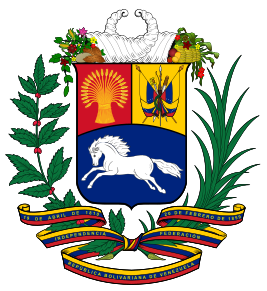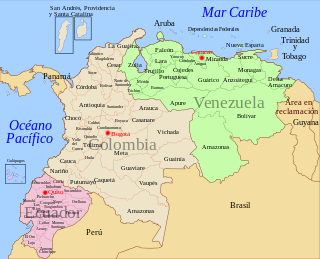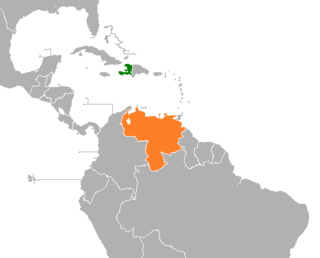
The Organization of American States, or the OAS or OEA, is a continental organization that was founded on 30 April 1948, for the purposes of solidarity and cooperation among its member states within the Western Hemisphere.

The foreign relations of Venezuela had since the early twentieth century been particularly strong with the United States. However, with the election of Hugo Chávez as President of Venezuela in 1998, the foreign policy differed substantially from that of previous Venezuelan governments.

Hugo Rafael Chávez Frías was a Venezuelan politician who was president of Venezuela from 1999 until his death in 2013, except for a brief period in April 2002. Chávez was also leader of the Fifth Republic Movement political party from its foundation in 1997 until 2007, when it merged with several other parties to form the United Socialist Party of Venezuela (PSUV), which he led until 2012.

Carlos Andrés Pérez Rodríguez also known as CAP and often referred to as El Gocho, was a Venezuelan politician and President of Venezuela from 12 March 1974 to 12 March 1979 and again from 2 February 1989 to 21 May 1993. He was one of the founders of Acción Democrática, the dominant political party in Venezuela during the second half of the twentieth century. His first presidency was known as the Saudi Venezuela due to its economic and social prosperity thanks to enormous income from petroleum exportation. However, his second presidency saw a continuation of the economic crisis of the 1980s, a series of social crises, a popular revolt, and two coup attempts in 1992. In May 1993 he became the first Venezuelan president to be forced out of office by the Supreme Court, for the embezzlement of 250 million bolívars belonging to a presidential discretionary fund.

The Union of South American Nations is an intergovernmental regional organization that once comprised twelve South American countries; as of 2019, most have withdrawn.

Since 2 February 1999, Venezuela saw sweeping and radical shifts in social policy, moving away from the government officially embracing a free-market economy and neoliberal reform principles and towards income redistribution and social welfare programs.

ALBA or ALBA–TCP, formally the Bolivarian Alliance for the Peoples of Our America or the Bolivarian Alliance for the Peoples of Our America – Peoples' Trade Treaty, is an intergovernmental organization based on the idea of the social, political and economic integration of the countries of Latin America and the Caribbean. The name "Bolivarian" refers to the ideology of Simón Bolívar, the 19th-century South American independence leader born in Caracas who wanted Hispanic America to unite as a single "Great Nation".

Relations between Cuba and Venezuela were established in 1902. The relationship was aggravated by the Cold War, with Venezuela tending to side with the United States, while Cuba was a loyal ally of the Soviet Union. A destabilizing factor was the alleged Cuban support for the antigovernment guerrilla force that operates in remote rural areas. In 1999 the bilateral relation significantly improved during the Presidency of Hugo Chávez. Chávez formed a major alliance with Cuban president Fidel Castro and significant trade relationship with Cuba since his election in 1999. The warm relationship between the two countries continued to intensify. After decades of close ties in the Caribbean, several governments in the region started to distance from the United States. Hugo Chávez described Castro as his mentor and called Cuba "a revolutionary democracy".
The Inter-American Democratic Charter was adopted on 11 September 2001 by a special session of the General Assembly of the Organization of American States, held in Lima, Peru. It is an inter-American instrument with the central aim of strengthening and upholding democratic institutions in the nations of the Americas. The Charter, which is binding on all 34 of the currently active OAS member states, spells out what democracy entails and specifies how it should be defended when it is under threat.

Socialism of the 21st century is an interpretation of socialist principles first advocated by German sociologist and political analyst Heinz Dieterich and taken up by a number of Latin American leaders. Dieterich argued in 1996 that both free-market industrial capitalism and 20th-century socialism in the form of Marxism–Leninism have failed to solve urgent problems of humanity such as poverty, hunger, exploitation of labour, economic oppression, sexism, racism, the destruction of natural resources and the absence of a truly participative democracy. Socialism of the 21st century has democratic socialist elements, but it primarily resembles Marxist revisionism.

The 2008 Andean diplomatic crisis was a diplomatic stand-off between the South American countries of Ecuador, Colombia and Venezuela. It began with an incursion into Ecuadorian territory across the Putumayo River by the Colombian military on March 1, 2008, leading to the deaths of over twenty militants, including Raúl Reyes and sixteen other members of the Revolutionary Armed Forces of Colombia (FARC). This incursion led to increased tension between Colombia and Ecuador and the movement of Venezuelan and Ecuadorian troops to their borders with Colombia.

The Community of Latin American and Caribbean States (CELAC) is a regional bloc of Latin American and Caribbean states thought out on February 23, 2010, at the Rio Group–Caribbean Community Unity Summit, and created on December 3, 2011, in Caracas, Venezuela, with the signature of The Declaration of Caracas. It consists of 32 sovereign countries in the Americas. Due to the focus of the organization on Latin American and Caribbean countries, other countries and territories in the Americas, Brazil, Canada and the United States, as well as the overseas territories in the Americas of France, the Netherlands, Denmark (Greenland) and the United Kingdom are not included.

The sixth Summit of the Americas was held at Cartagena, Colombia, on April 14–15, 2012. The central theme of the summit was "Connecting the Americas: Partners for Prosperity." The main issues at the summit's agenda was the exclusion of Cuba, the legalisation of drugs to fight the War on Drugs and Argentina's sovereignty claims over the Falkland Islands. Additionally, criticism of an expansionist monetary policy was also leveled on the developed economies. A final statement was not forthcoming over the issue of Cuba's inclusion in the next summit which was supported by all states except the United States and Canada, who refuse the southern support. However, the 7th Summit of the Americas was chosen to be held in Panama.

The 2010 Colombia–Venezuela diplomatic crisis was a diplomatic stand-off between Colombia and Venezuela over allegations in July by Colombian President Álvaro Uribe that the Venezuelan government was actively permitting the FARC and ELN guerrillas to seek safe haven in its territory. Uribe presented evidence to the Organization of American States (OAS) allegedly drawn from laptops acquired in a raid on a FARC camp in Ecuador.

Bolivarian Alliance for the Americas (ALBA) has 10 member states and three observer states. In addition, Suriname is a "special guest member" which intends to become a full member.
The integration of Latin America has a history going back to Spanish American and Brazilian independence, when there was discussion of creating a regional state or confederation of Latin American nations to protect the area's newly won autonomy. After several projects failed, the issue was not taken up again until the late 19th century, but now centered on the issue of international trade and with a sense of pan-Americanism, owing to the United States of America taking a leading role in the project. The idea of granting these organizations a primarily political purpose did not become prominent again until the post-World War II period, which saw both the start of the Cold War and a climate of international cooperation that led to the creation of institutions such as the United Nations. It would not be until the mid-20th century that uniquely Latin American organizations were created.

The foreign policy of the Ollanta Humala concerns the policy initiatives made towards other states by the former President of Peru, in difference to past, or future, Peruvian foreign policy as represented by his Foreign Minister Rafael Roncagliolo. Humala's foreign policy was based on relations with other states of the Americas.

Haiti–Venezuela relations are relations between Haiti and Venezuela. Venezuela has an embassy in Port-au-Prince, and Haiti has an embassy in Caracas.

Mexico–Venezuela relations are foreign relations between Mexico and Venezuela. Both nations are members of the Association of Caribbean States, Community of Latin American and Caribbean States, Latin American Integration Association, Organization of American States, Organization of Ibero-American States and the United Nations.
The I CELAC summit or 2013 CELAC summit was the first ordinary heads of state summit of the Community of Latin American and Caribbean States. It was held on 27 and 28 January 2013 in Santiago, Chile.
















